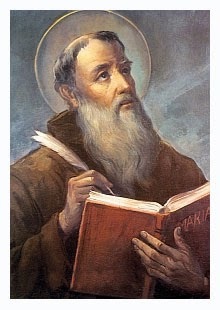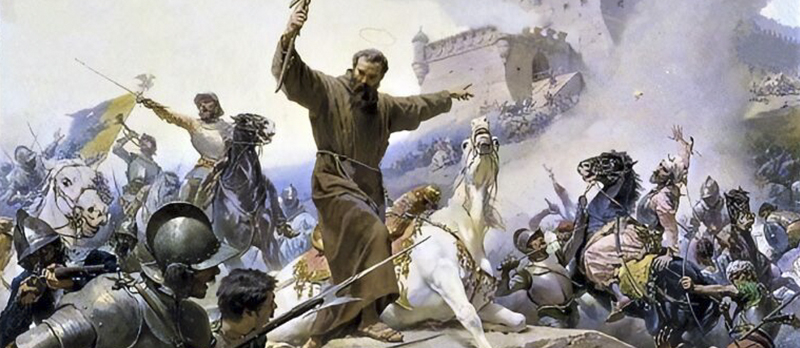 OTHER
OTHER
St. Lawrence of Brindisi
Lawrence mounted his horse and, crucifix in hand, rode unarmed at the head of the troops to the battlefield.
Cecelia Matt
LAWRENCE OF BRINDISI was born in the city of Brindisi, in the kingdom of Naples, in 1559. A spiritual child, even in his early years there were indicators that he had a vocation to the priesthood.
In Naples during the 1500s there was a custom, in remembrance of the Child Jesus in the Temple, that at Christmas time boys were allowed to preach in public once turning twelve. Lawrence was gifted, and therefore only six years old when he was selected to preach in the cathedral of Brindisi. He preached with such extraordinary force and sanctity that his audience was deeply touched, and many reformed their lives.
At the age of sixteen he was finally allowed to enter the Capuchin friary at Verona where he distinguished himself immediately. An aura of peace surrounded him and he was a model student, punctual at all the community exercises, perfect in his submission to superiors, and full of respect and charity towards his brethren.
When his novitiate was over, Lawrence continued to pursue his studies. He especially excelled in philosophy and theology, and acquired so complete a grasp of foreign languages that he was able to preach in French, Spanish, German, Greek, and even in Hebrew.
When asked how he became so skilled he always claimed it was through no talent of his own, but rather the special help he received from Our Lady, the Seat of Wisdom, to whom he had the greatest devotion.
Given his linguistic skills, after finishing his studies Lawrence started out on a highly fruitful missionary life, despite his personal preference for solitude. He spent time in the various large cities of Italy; Venice, Pavia, Verona, Padua, Naples, where his labors were blessed with remarkable success. At the age of thirty-one, he was elected superior of the Capuchin Franciscan province of Tuscany, despite his personal reluctance for the assignment. In 1596 he was appointed definitor general in Rome for the Capuchins. Pope Clement VIII assigned him the task of preaching to the Jewish inhabitants in the city. His thorough knowledge of the Hebrew language won him the respect of Rome’s rabbis, and his sanctity and kindness led many Jews to baptism.
In 1598 his order sent Lawrence to Germany with eleven other friars to establish Capuchin convents there and to counteract the Protestant heresy of Luther, which was at that time growing and gaining strength in Austria. As always, his endeavors were fruitful and he brought many Protestants back to Catholicism with his preaching.
The Emperor of Austria, Rudolph II, was impressed with Father Lawrence’s missionary results and his ability to change hearts, and so entrusted him with a new task: organizing a crusade against the Turks who at the time were threatening to invade the whole of Christian Europe. Poor Lawrence simply wished to preach in seclusion to the common people, but he was now obliged to visit the principal cities of Germany to negotiate the crusading cause with various princes, as well as preaching it to the people. God blessed his mission and once again his efforts proved successful.
Around this time, while he was saying holy Mass in Munich, our Lord appeared after the elevation in the form of a resplendent Child, who lovingly caressed Lawrence, reassuring him that all would be well. Frequently Lawrence was so affected during the celebration of holy Mass that he shed copious tears and the altar linens touched by his tears were later used on the sick, who were immediately cured.
After gaining the support of the nobles, Lawrence was made the chief chaplain of the powerful army of Archduke Matthias, which in 1601 formally began their march against the Turks. Although quite crippled with rheumatism by this point, Lawrence mounted his horse and, crucifix in hand, rode unarmed at the head of the troops to the battlefield.
Their goal was to reclaim the city of Székesfehérvár, which had been occupied by the Turks since 1453.
The first sight of the enemy was disheartening for the Christian troops, for the Ottoman position was favorable and their numbers far superior to the Christian forces. But Lawrence rode back and forth at the front of the army and in the name of God promised victory, inspiring them all. The enemy was completely routed and the Catholic forces won an unexpected and decisive victory, taking back the city which had been under Ottoman control for the past 150 years.
Lawrence then returned to Italy, hoping he might finally serve God in his beloved solitude. But instead his order unanimously elected him vicar general.
He was obliged in obedience to accept the office, although he viewed it a heavy burden. He proved to be a charitable and vigilant pastor to his brethren. When his term expired, he was appointed by the pope to the service of the Holy See, becoming papal nuncio to Bavaria and Spain. After serving as nuncio, he retired to a monastery in 1618.
Sadly his solitude was not to last, and within a year the pope recalled him and once again sent him to the kingdom of Naples, his native land. The kingdom at that time belonged to Phillip III of Spain, but it was governed by a viceroy who cruelly oppressed the people. The only hope lay in presenting the people’s grievances to the king through Father Lawrence. The latter sympathized with the people and journeyed to Spain, only to learn that the king was then in Portugal. So on he went to Lisbon, where he pleaded the people’s cause and successfully obtained the dismissal of the corrupt viceroy.
This errand of charity proved to be his final mission. Lawrence fell very ill in Lisbon. He knew that his end was drawing near and told his companions to prepare for his death. After devoutly receiving the last sacraments, he fell into ecstasy and peacefully died on July 22, 1619, at the age of sixty.
Pope Pius VI beatified him in 1783, and on December 8, 1881, Pope Leo XIII canonized him. In December of 1958, Pope John XXIII signed a decree declaring St. Lawrence of Brindisi to be a Doctor of the Church.
A warrior without weapons who marched into battle regardless, who followed where God led despite the hardships, constantly speaking up against injustice and denouncing the Church’s enemies, St. Lawrence is an excellent role model for all of us living in turbulent times.

St. Lawrence of Brindisi, pray for us. ¦ Recommended Reading: The Standard Bearer of the Roman Church: Lawrence of Brindisi and Capuchin Missions in the Holy Roman Empire (1599-1613) by Andrew Drenas. Washington, DC: CUA Press, 2018.
Fonte Foto: http://www.saintsinrome.com/2013/08/st-lawrence-of-brindisi.html
Fonte:
https://remnant-mn.newsmemory.com/?token=0adb4b08ddc23559a8d83ef6dc0d26b5_632399fd_980&selDate=20220915&goTo=01&artid=0&msgid=229157oA5yOt9inL9zlOzxUdx68bLa6g
Back to the news


